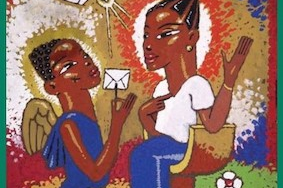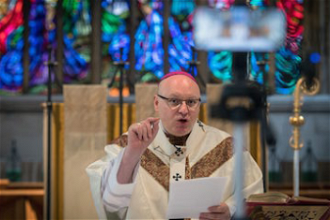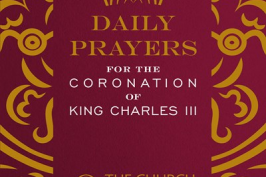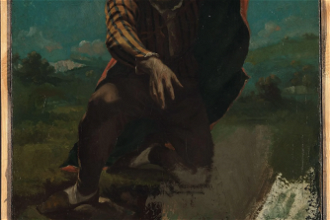Plight of Turkana people discussed in House of Lords
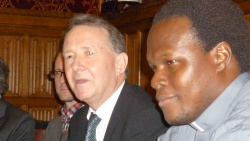
David Alton, Fr Steven at the meeting
How can you help a nomadic, pastoralist people cope with consequences of climate change that have brought inter-tribal conflict, famine, drought, malnutrition and disease? How can you enable them to proactively take control of their futures?
These were questions addressed by Father Steven Ochieng, a parish priest working with the St Paul's Missionary Community in Turkana, Northern Kenya, at a meeting hosted by Lord Alton at the House of Lords on Wednesday night.
The seminar was attended by members of the House of Lords, MPs, students and parishioners from Holy Apostle Church in London which is twinned with Father Steven’s parish, Lady Queen of Peace in Todonyang. There were also representatives from the charity New Ways, which supports the community's work in education, health, water, peacemaking and sustainable development projects.
Lord Alton explained that Turkana, a region in Kenya near the borders between Ethopia and Sudan, about the size of Ireland, is home to the Turkana tribe. As rainfall has declined, tribes such as the Dassenechs have begun to arrive from Ethiopia competing for resources. Man made weapons are finding their way into hands previously engaged with peaceful tilling and harvesting of the land and there have been several violent clashes.
Father Steven said: “All people share the same aspirations, as do the Turkana. That is, family, security, food.” However, those aspirations are becoming increasingly under threat. Father Stephen went on to describe the nature of their plight: “Indigenous knowledge is no longer relevant to the present day conditions and the people no longer understand the systems of their natural environment.”
Wind directions have changed, seasons have moved, and the make up of the landscape is rapidly evolving in response. Whereas once, the Turkana would dig ponds close to the river, the river would overflow and fill the ponds with water that could be drawn when the river receded. This is no longer possible. The Omo River is drying up rather than over flowing, and as the population grows, water is reducing.
New Ways is developing sustainable methods to help the Turkana counter the effects of climate change and conflict. Water catchment dams are being built to supply people and livestock with drinking water. Local people are being trained to build and repair fishing boats, and being taught how to manage small businesses so that they can sell the fish they catch. The training in itself is a form of enterprise, with Turkana people exchanging livestock for timber and nails to build boats. The livestock are then used to provide food for the children in the nutrition centres that have been set up to help with family welfare.
Baroness Masham of Ilton said that the St Paul’s Missionary Community in Todonyang is similar to an early monastic order. Like the early Christian monasteries, the St Paul’s Missionary Community is a faith based centre that extends care and practical support to the people of the area in which they live.
Representatives from each community within the tribe are being selected by New Ways to be agents of change. They are provided with education and training in good practice farming methods that they can then take back to their communities and pass on. Farming and vegetable gardens are being created and preserved using simple methods. For instance, planting trees around young crops helps protect them from the drying effects of the winds. Building tanks on elevated platforms helps create good water pressure in a constant supply.
New Ways also focuses on the education and welfare of young people. Angela Docherty is Executive Director of New Ways. She explained: ”Schools have been set up where food and nutrition are provided to young children. Without this early intervention, the children’s development would otherwise be severely effected by malnutrition”. This kind of knowledge and support are crucial to the tribe, whose future depends on the education and health of its younger generations".
While much of New Ways work is a response to current problems, Father Steven explained that all the projects focus on long term empowerment of the local people, helping them attain confidence and independence that are key to sustainability.
The greatest route to empowerment is through education, including awareness of the alternatives to violence. A central role towards empowerment and peace, is played by the local Church. By encouraging opposing tribes to think about what unites them, rather than what divides them, people become more clearly aware of their choices. With training, education, new skills and methods for their livelihood, there are other options to fighting over resources. The Church has become a merging point of interaction and engagement between the tribes, a place of mutual ground, where bridges can be built and paths to peace laid down. In so doing, there is a chance to overcome the severe threats that face this small group and their fragile ecosystem.
To find out more about how New Ways are planting seeds of hope amidst increasingly harsh conditions, visit www.newways.org.uk.



